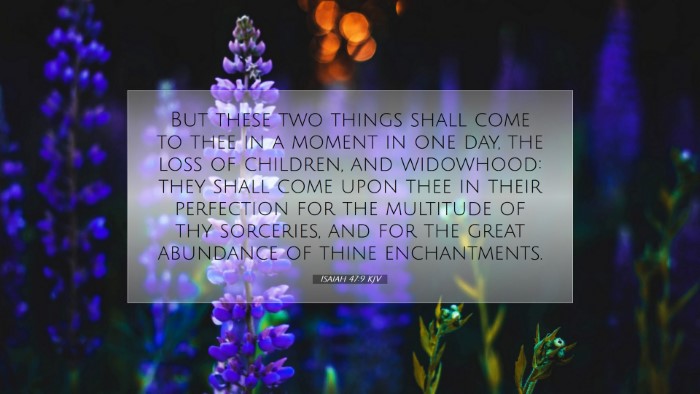Bible Commentary on Isaiah 47:9
Verse: "But these two things shall come to thee in a moment in one day, the loss of children, and widowhood: they shall come upon thee in their perfection for the multitude of thy sorceries, and for the great abundance of thine enchantments."
Understanding the Context
The prophecy in Isaiah 47 rebukes the pride and arrogance of Babylon. This chapter serves as a vivid warning of impending judgment and destruction due to the nation's reliance on sorcery and enchantments instead of trust in the true God. The city, personified as a woman, is called to behold her future downfall.
Within the broader context of chapters 46 to 48, Isaiah's message contrasts the sovereignty of God with the futility of idolatry and the deceptive nature of false systems of power.
Matthew Henry's Perspective
Henry highlights that these calamities represent not just physical loss but spiritual consequences as well. He notes that "the loss of children" signifies utter devastation in familial lines, while "widowhood" speaks to vulnerability and desolation. Henry emphasizes that these tragedies occur swiftly and in full measure—stressing the seriousness of their impending doom as a divine consequence of Babylon's disobedience.
He asserts that Babylon’s reliance on sorcery will not shield her from God’s judgment. The swift nature ("in a moment in one day") underscores the unexpectedness of God's actions, overwhelming treaties and alliances built on falsehood.
Albert Barnes' Commentary
Barnes elaborates on the phrase "these two things shall come to thee," interpreting the judgment as a dual calamity. He holds that the language reflects a powerful certainty of execution. Given Babylon's history of oppression, particularly against Israel, the judgment is seen as a form of divine justice.
He connects the concept of "sorceries" and "enchantments" directly to the practices that led to Babylon’s moral and spiritual corruption, suggesting that reliance on such practices leads to disastrous consequences. Barnes recognizes the immediacy of the judgment, suggesting it serves as a stark warning to nations and individuals alike who turn away from God.
Adam Clarke's Insight
Clarke provides a focus on the nature of Babylon’s sins and the resulting punishment. He comments on the multifaceted nature of the stated calamities as not merely physical losses but a symbolic indication of spiritual ruin. Clarke posits that the mention of "the multitude of thy sorceries" alludes to the widespread and deeply ingrained practices of sorcery within the context of Babylon’s societal fabric, emphasizing their futility against divine authority.
He explains that the immediacy of these judgments is reminiscent of the sudden judgment that befell other ancient cities, serving as a clarion call for humility before God. Clarke also suggests that this serves as a reminder to God’s people about reliance on His providence rather than worldly means.
Theological Reflections
- Divine Sovereignty: The text illustrates the ultimate authority of God. The plight of Babylon serves as a reminder that no earthly power can withstand judgment when it stands against divine order.
- Moral Responsibility: Each nation, like Babel, holds moral responsibility for its actions. This passage encourages nations and individuals to reflect on their ways and turn towards righteousness.
- The Nature of Sin: The sorceries and enchantments symbolize the deceptive allure of sin. The swift onset of judgment warns that sin often carries immediate and devastating consequences.
- Hope for Deliverance: While this passage speaks to devastation, within the broader lens of Isaiah, there exists a promise of redemption and hope for those who turn back to the Lord.
Practical Applications
This verse challenges believers to consider what 'sorceries' they might be relying upon today. It encourages a thorough examination of one's life in pursuit of genuine faith that relies solely on God. Pastors and theologians can motivate their congregations to seek spiritual truths outside of societal trends and occult practices, reiterating the importance of faith amidst the chaos.
Furthermore, as students of Scripture dive into this text, they are encouraged to contextualize the journey of Babylon as not just historical but also reflective of current global patterns of turning away from God. In sharing the message of hope and restoration, it highlights the importance of preaching against the allure of false securities and aiming hearts back to faith.
Conclusion
Isaiah 47:9 serves as a potent reminder of the consequences of pride and the pursuit of false security through earthly means. It encapsulates God's resolve in holding nations accountable while also extending an invitation to repentance. By combining insights from various public domain commentaries, this commentary serves as a rich resource for pastors, students, and scholars seeking to understand the depth of God's message through the lens of historical judgment and the hope of redemption.


